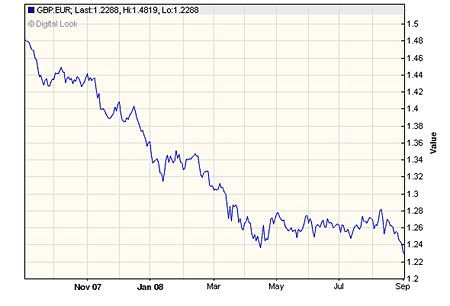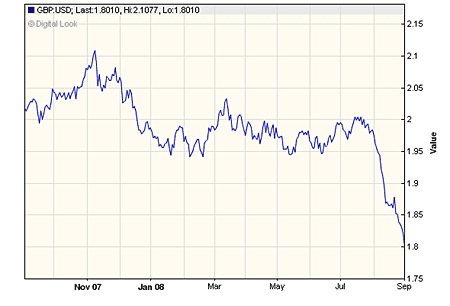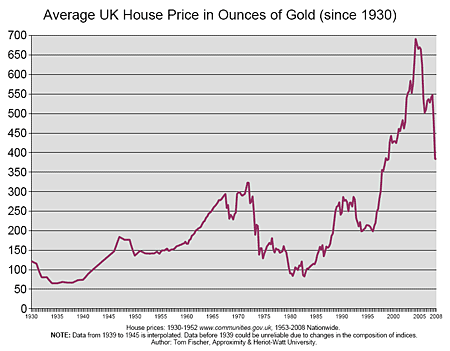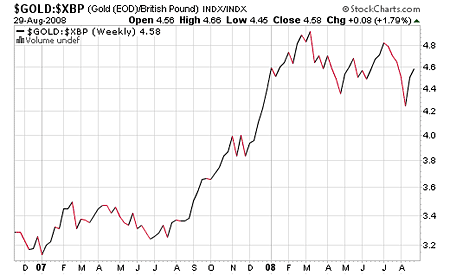How house prices could fall by 75% from here – in gold terms
British houses now cost the equivalent of around 400 ounces of gold. A house bought in the 1930s or late 70s cost 100 or less. That means that house prices have a good way to fall yet – and that may not be such a bad thing, says Dominic Frisby.
Get the latest financial news, insights and expert analysis from our award-winning MoneyWeek team, to help you understand what really matters when it comes to your finances.
You are now subscribed
Your newsletter sign-up was successful
Want to add more newsletters?

Twice daily
MoneyWeek
Get the latest financial news, insights and expert analysis from our award-winning MoneyWeek team, to help you understand what really matters when it comes to your finances.

Four times a week
Look After My Bills
Sign up to our free money-saving newsletter, filled with the latest news and expert advice to help you find the best tips and deals for managing your bills. Start saving today!
"What I'm confident about is that we will get through it," said Alistair Darling yesterday about the current economic crisis.
Well, of course, we'll get through it. What I want to know is will we get through it with a currency?
It is a government's duty to provide its people with opportunity. So we must thank Alistair Darling for giving us with his wise words on Saturday what has to be the easiest money-making opportunity of the year: to sell the pound as soon as the markets opened on Monday. Not since Northern Rock a year earlier has such an obvious trade presented itself.
MoneyWeek
Subscribe to MoneyWeek today and get your first six magazine issues absolutely FREE

Sign up to Money Morning
Don't miss the latest investment and personal finances news, market analysis, plus money-saving tips with our free twice-daily newsletter
Don't miss the latest investment and personal finances news, market analysis, plus money-saving tips with our free twice-daily newsletter
I said in MoneyWeek's New Year predictions for 2008 that I wouldn't rule out a sterling crisis later in the year. That moment is looking more and more likely. If it is the government's intention to devalue sterling as quickly as possible, it's hard to see how they could improve on the job they're doing.
Then again they may just be incompetent.
The story behind the pound's devaluation
Let's start with some charts of sterling. Two pictures that each tell a thousand ugly words. The pound against the euro:

And against the dollar:

The downturn accelerated in October-November 2007, shortly after Gordon Brown announced that he would not be holding a November election. The horrid realisation must have dawned on forex traders that we had three more years of the bloke and they began hitting the sell button. But it was an orderly decline. He can't last three years, surely?' they thought.
Then as August began, the grim reality hit home that not only was he coming back from his holiday, but that he had no intention of resigning, despite dire Scottish election results. We had what is known as a mad rush for the exit, punctuated by a brief moment of respite as somebody won another gold medal, then downwards into the abyss.
Just as you thought you could take a breather last Saturday - perhaps watch a bit of footy or take a stroll by the river - Darling has his Road-To-Damascus-Meets-Trisha moment and onwards and downwards went the pound.
Anything that you, me or my Aunt Joan own which is denominated in sterling has lost 15% of its value in a year in currency alone.
Devaluing sterling effectively devalues the Government's debt, so you might think for a second it's deliberate. But you know deep down it isn't. It's that old Labour favourite: incompetence.
The Government can't hope to save the housing market
Do they honestly think they can save the housing market? With this new £175k stamp duty threshold, I feel sorry for anyone who is struggling to sell a property currently valued at £250k. Before you can say party political broadcast, they're going to be getting a whole load of offers at £175k, plus some cash for curtains and white goods.
Interest-free loans to help low earners to get on the housing ladder! If they're low earners, why are you trying to get them into debt? That is highly irresponsible, is it not? How will they pay that debt back? They might go on to become high earners, yes, but then they might not - and with this lot in charge of the economy the latter is more likely and what then? This is imprudent lending the very cause of the problem.
The cure for the property crisis
It's so simple. Why not just let prices fall to a level which people can afford? The excesses of the previous 14 years are purged and trade will begin again. That is the cure for all this: lower prices. Why do they feel the need to interfere all the time?
Interest-free loans are highly inflationary. Labour is attempting to save the housing market at the expense of the currency. It is attempting to bail out debtors, when it is their very excesses that created this mess. Why not bail out those who saved instead? Why should the prudent have had their savings value eroded by 15% in one year because of their leaders' incompetence?
Here is an update of a chart I like to show from time to time. It shows how many ounces of gold it takes to purchase the average UK house since 1930. My thanks to Tom Fischer of Herriot-Watt University for putting together. It is a wonderful chart and well worth studying.

You can see the price rises during periods of credit expansion and declines during periods of contraction. Nothing Darling does can change the inevitability of further falls. He has two choices: to simply let prices fall to the point where houses have become affordable again; or, the option he appears to have taken, which is to devalue sterling, so the falls don't seem so bad. But the net result the real value of houses - will be the same.
If the UK really is in the worst state it's been for 60 years, as Darling says, then look at the lows set during in the 1930s and the late 1970s. One hundred or less of gold ounces to buy the average UK home. That would mean another 75% fall from here, measured in gold. Impossible? Well
Let's just say, for the sake of argument, that sterling falls by another 20% against the dollar (I think it will be more). That will take us to $1.40. (It's been there before). Let's also say housing falls by another 25%, which would more or less mirror the falls of previous downturns. We would have an average price of £123,490. And let's say gold reaches its inflation-adjusted all-time high of around $2,000. Then you see an average UK house price of just over 85 ounces of gold. It's not so impossible.
Gold may be all over the place in dollar terms, but such is the dire state of sterling, anyone who has been buying gold with their pounds will have been doing very well. The last twelve months have seen gold go from about £330 an ounce to £460. That's a nice 40% gain in a year.
Thank you very much, Mr Darling.

Our recommended articles for today
Where will this bear market end?
For the average Briton, the near future is likely to be tough. Borrowers may 'hit a brick wall' as mortgage arrears rise, credit cards are maxed out and unemployment looms. But one thing is certain: the only way out of the current bear market is via the bottom, whenever that may be.
How to cash in on Wyoming's pipeline problem
The US state of Wyoming is enjoying a natural gas boom. Wells are springing up all over - but there is a shortage of pipelines. Here, we tip a few companies likely to make a mint out of building the infrastructure to get the gas out.
Get the latest financial news, insights and expert analysis from our award-winning MoneyWeek team, to help you understand what really matters when it comes to your finances.
MoneyWeek is written by a team of experienced and award-winning journalists, plus expert columnists. As well as daily digital news and features, MoneyWeek also publishes a weekly magazine, covering investing and personal finance. From share tips, pensions, gold to practical investment tips - we provide a round-up to help you make money and keep it.
-
 Should you buy an active ETF?
Should you buy an active ETF?ETFs are often mischaracterised as passive products, but they can be a convenient way to add active management to your portfolio
-
 Power up your pension before 5 April – easy ways to save before the tax year end
Power up your pension before 5 April – easy ways to save before the tax year endWith the end of the tax year looming, pension savers currently have a window to review and maximise what’s going into their retirement funds – we look at how

